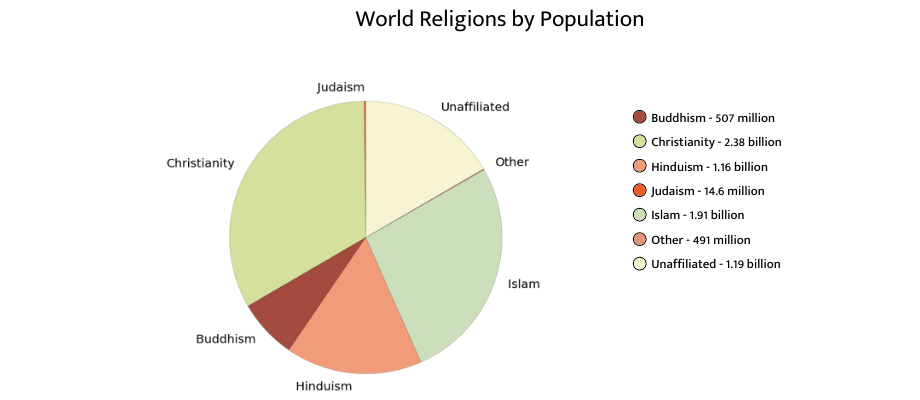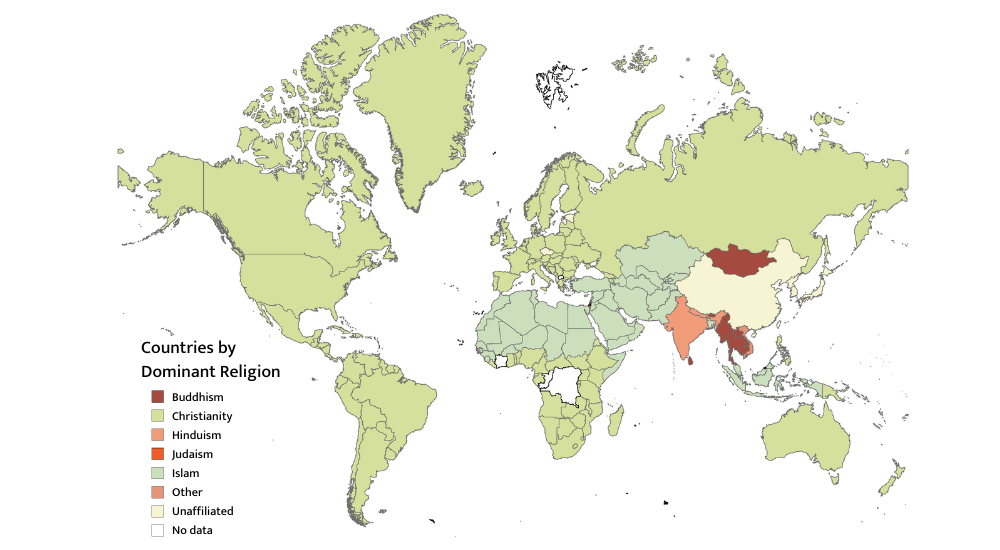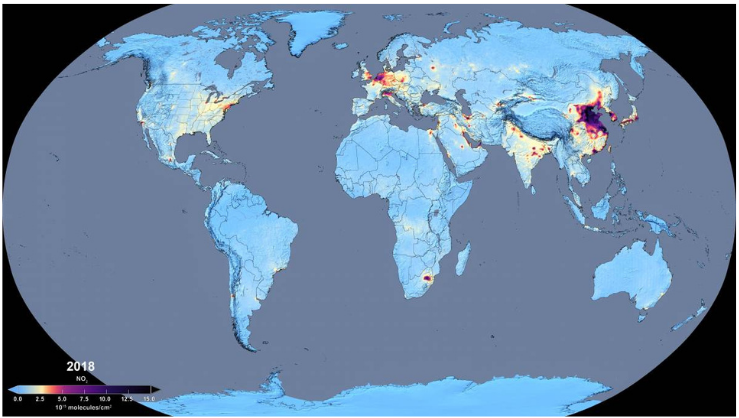*Note: for this article, I will be using the common noun “earth” to refer to the matter in our environment rather than the planet specifically, as it is generally referred to in religious texts.
“Of the three: humans, society and nature, we are the ones who begin to make changes. But in order to effect a change, we have to heal ourselves, we have to be whole. Since it requires the kind of environment conducive to healing, one must seek the kind of lifestyle that is free from the destruction of mankind. Both efforts to change the environment and to change oneself are necessary. But we know how difficult it is to change the environment if the individuals themselves are not in a state of equilibrium.” – Thich Nhat Hanh
Table of Contents:
- Stewardship and Judaism
- Stewardship and Christianity
- Stewardship and Islam
- Stewardship and Hinduism
- Stewardship and Buddhism
- What does this mean for global environmentalism?
Approximately 85% of the world’s 7.9 billion people consider themselves a member of organized religion. Of that 85%, over 70% belong to one of the five major world religions: Judaism, Christianity, Islam, Hinduism, and Buddhism.
When I was growing up, I received a heavy emphasis on caring for nature and the environment in both school and church, and have often wondered why the topic of environmentalism and faith is typically left out of the broader conversation. After all, if the goal is to exponentially increase environmental stewardship across the globe, wouldn’t it be logical to appeal to people’s faith?
This article will provide a brief overview of the relationship between environmentalism and each of the five major world religions.
Stewardship and Judaism
The roots of Jewish environmental stewardship begin with the well-known story of Adam and Eve in the Book of Genesis, the first book of the Hebrew Bible or Tanakh.
According to scripture, God created mankind in his own image and gave them “dominion” over the earth and its creatures. The passage:
“When no plant of the field was yet in the earth and no herb of the field had yet sprung up - for the LORD God had not caused it to rain upon the earth, and there was no one to till the ground” — Genesis 2:5
suggests that man was created at least in part for the role of nature’s caregiver.
Immediately after creating Adam, God created the Garden of Eden, a paradise in which he was given free rein, except for the Tree of Knowledge. Eve was tempted by the serpent to eat the fruit from the forbidden tree and gave some to Adam. As punishment for their disobedience, they were cursed with mortality.
Interestingly, part of their disciplinary fate entailed cursing the ground, producing “thorns and thistles” [3:18] and causing man to work harder to grow crops. This punishment essentially shifts the idea of stewardship from an honor to a challenge.
Additionally, the principle of bal tashchit prohibits the needless destruction or waste of anything that may be useful to people. Although this idea has been interpreted in many different ways, the root of it has served as the foundation of modern Jewish environmentalism and ecology. Currently, Jewish grassroots environmental movements such as Jewcology are gaining traction around the world, working on projects such as compiling and sharing environmental information and educating the public on the basis for environmentalism in the Torah.
Stewardship and Christianity
Christians believe that God created the universe and everything in it. In the Bible, there is a strong sense that God as the creator is essentially the owner of the world, and we are the tenants. As such, it is the sacred duty of humankind to care for God’s earth.
This idea is strengthened by the notion that God created the earth and everything on it specifically for humans and we must not take it for granted.
Although many denominations view the story of Adam and Eve as a parable rather than true history, the environmental principles (as well as the relationship between God and his people) remain relevant to Christians and the idea of stewardship is sprinkled throughout the New Testament.
One key difference that arises upon peering through the Christian lens of environmentalism is the Book of Revelation. Essentially, it is believed that the earth is a temporary home for humankind and it is our duty to care for it while it exists. That is, the notion that the planet, or even the universe, will last as long as we care for it is not shared by Christianity.
Because of the strong emphasis on leading by example as Jesus did, the idea that we must each individually strive to embody the role of stewards of the earth has been popularized recently by religious leaders.
Pope Francis, leader of the Roman Catholic Church, took his name from the patron saint of ecology and nature. He has been very outspoken on the topics of environmentalism and climate change since his election in 2013, releasing the papal encyclical Laudato si in 2015, about the threat of climate change and its disproportionate effects on the poor.
Stewardship and Islam
The notion of stewardship is strong in the Quran, the holy book of Islam. Beginning with the familiar story of Adam and Eve, God calls Adam his khalifah, or steward. In this version of the story, God explicitly tells Adam that it is the job of him and his descendants to care for the earth.
In 2015, the Islamic Declaration on Global Climate Change was made. According to the United Nations Climate Change, this declaration calls Muslims around the world to commit to 100% renewable energy as soon as possible, specifically calling out wealthier Muslim nations that have the ability to shift to renewable energy and contribute to lower global emissions.
Stewardship and Hinduism
Hinduism is a Dharmic religion, meaning that it relies on a set of spiritual obligations known as dharma. Each rule within the dharma is important, however, the most import one to environmentalism is the one the prohibits the injury or killing of living things.
In fact, there are many quotes within Hindu scripture explicitly stating ways to care for nature, some obvious ones being:
- “Do not cut trees because they remove pollution.” — Rig Veda 6:48:17
- “Do not disturb the sky and do not pollute the atmosphere.” — Yajur Veda 5:43
- “Don't destroy forests with tigers and don't make forests devoid of tigers. Forests can't be saved without tigers and tigers can't live without forests because forests protect tigers and tigers protect forests.” — Virat Parrva 5:45-46
- “One should protect the habitation.” — Rig Veda Samhita VI:71:3
Another relevant teaching of Hinduism is the idea that the environment is made up of the five great elements that must remain in balance. These elements are Space, Air, Fire, Water, and Earth. This article on VedicFeed explains them in more detail, but it is important to note that each element refers not only to the physical object that it describes, but also to physical, spiritual, and emotional relationships between all things. In essence, all things are connected. As this article explains, each of the five human senses relates to an element, outlining the complicated but vital network between humans and the environment.
And finally, circling back to the sanctity of all life, is the idea of the atman, which essentially means “soul” or “self.” A major difference between Hinduism and the primary monotheistic religions is that atman is not unique to humans, but rather all living things.
Stewardship and Buddhism
Buddhism is a unique religion in that it is often regarded as more of a spiritual lifestyle than an organized religion. This faith does not worship any deity, but rather emphasizes personal enlightenment and inner peace.
Buddhism is deeply rooted in the idea of personal peace and the concept that your individual actions are key to building a just world.
A cornerstone of Buddhism is the practice of ahisma or nonviolence, one of the five precepts of Buddhism. This principle applies no only to humans, but to all living things. Thus, causing harm or death to any form of life is considered immoral, including the malicious or needless destruction of plants and crops.
According to the website Eco-Buddhism, Buddhists believe that “All external and internal phenomena, the mind and its environment, are considered inseparable and interdependent.” Additionally, it is believed that that change comes from within—collective change cannot occur without personal change.
In 2008, world-renown Buddhist monk Thich Nhat Hanh published a book entitled “The World We Have – A Buddhist Approach to Peace and Ecology”, in which he outlines a grim future resulting from lack of environmental action and proposes solutions rooted in Buddhist teachings.
What does this mean for global environmentalism?
There are innumerable similarities in the relationships between environment and faith within each major world religion. Some similarities include:
- Humane treatment of people and animals
- All life is sacred
- Humans have a responsibility to care for nature
- Social change comes from personal change
There is a clear message within the original scripture and moral codes of each religion that we as humans have a responsibility to care for our beautiful planet.

Below, I have created a map of the world showing the dominant religion in each country. Comparing it to the satellite map of Nitrogen dioxide (NO2) content below, it is clear that the majority of the populations of high-NO2 producing countries belong to a religion, such as India, the United States, South Africa, and much of central Europe and the Middle East.

Thus, religious calls to stewardship such as the Islamic Declaration on Global Climate Change directed at able primarily-religious countries can be a powerful tool for persuading the minds of world leaders who have the authority to make meaningful change.
Recent Events
In October of 2021, the Vatican hosted the “Faith and Science: An Appeal for COP26” conference which invited religious leaders from all over the world to discuss and appeal to their governments and their people. The main takeaway from the conference was unity—that caring for our planet must be a global effort.
Nearly forty religious leaders signed the Appeal, which was presented by Pope Francis to the leaders of COP26, the 2021 United Nations Climate Change Conference, which is taking place from October 31 to November 12, 2021.
You can read the Joint Appeal Executive Summary here.



